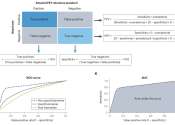Blood test 91% accurate at predicting Alzheimer's, outperforming doctors
A new test gauging levels of key proteins in the blood was far more accurate than doctor assessments in spotting Alzheimer's disease in people with early-stage illness.
Jul 29, 2024
0
124









